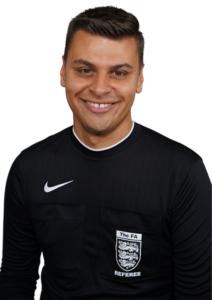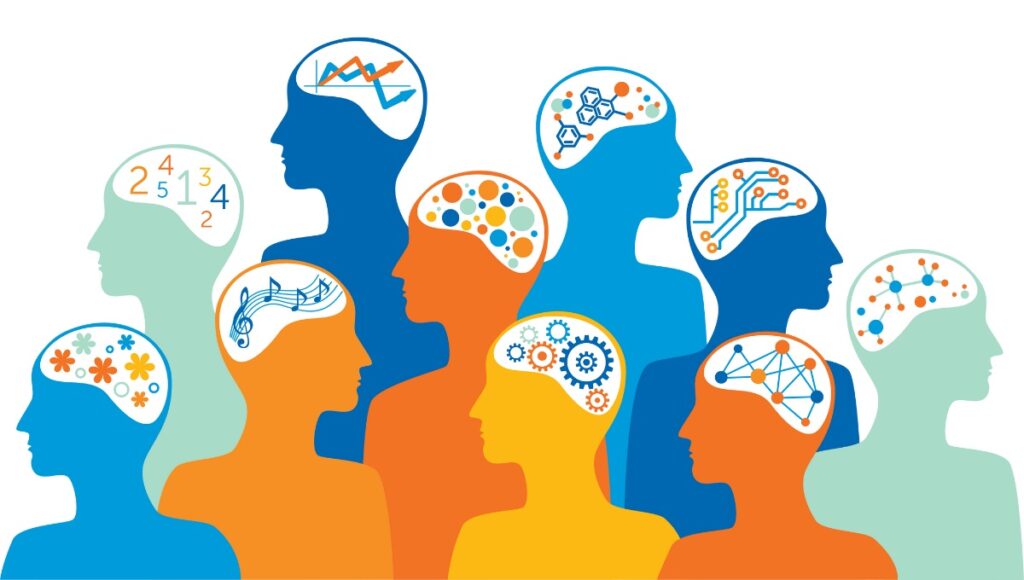When you think about refereeing, specifically at the elite level, “neurodivergence” doesn’t tend to be the first thing that comes to mind. But, research has shown that there is a large population density of neurodivergent individuals in global elite level sport. Why is this? What does this mean both for officials and for refereeing in general?
What is Neurodivergence or Neurodiversity?
Firstly, what is neurodivergence or neurodiversity? A neurodivergent individual is someone who “has one or more ways in which their brain functions outside the ‘typical’ way”. This can manifest itself in ADHD (otherwise known as ADD), ASD (otherwise known as Autistic Spectrum Disorder), dyspraxia, dyscalculia, Tourette’s Syndrome or dyslexia. To be clear, this Blog will not be engaging with the question surrounding the use of the word ‘disorder’ in many of these diagnoses. Nor, will it deal with the societal aspects of neurodivergence outside of officiating and sport.
Important Things to Remember
Before exploring this subject there are a few things that need to be stated. Firstly, all of the aforementioned examples of neurodiversity occur on a spectrum. My favourite way of visualising this is as a colour chart encompassing all of the colours of the rainbow. The point here is that the majority, though not all, of the above examples are umbrella terms. Many individuals with ASD will have different behaviours that classify them as “autistic”, and among the individuals who have the same, or similar, traits will display them in different ways. The same goes for ADHD.
Essentially, what I am trying to say here is that there is no hard and fast checklist for neurodivergence. It’s a grey area, and as such easy to miss. This is compounded by the significant overlaps in stereotypical behaviours associated with different kinds of neurodivergence. Two good examples of this are the overlap between ADHD and ASD.
Additionally, although it may be fairly obvious, it is important to underline that when someone has ASD, ADHD or any of the above this doesn’t make them contagious. These are neuro-developmental, meaning there they have a genetic component. To put it bluntly, you can’t “catch” ASD, ADHD or any kind of neurodivergence.
ADHD
Refereeing in Relation to ADHD
The acronym ADHD stands for ‘Attention Deficit Hyperactivity Disorder’, and a classic behaviour exhibited is constant movement, be it constantly solving then un-solving a rubix cube, tapping, or playing with long hair. Typically, though not always, children with severe ADHD tend to excel in primary school but struggle in secondary school (after the age of eleven). Again, I would like to stress that this is not true for all individuals with ADHD, and that my example is an extreme case.
How this relates to refereeing is, on the surface, very simple: people with ADHD tend to prefer being active, which lends itself to officiating.
A study has shown that the tendency of people with ADHD to gravitate towards refereeing could be explained, in part, by neurotransmitters. Being active is known to increase the amount of neurotransmitters in your brain, which has the knock-on effect of temporarily reducing the severity of ADHD symptoms. However there is more to it than this. The research states that 4% to 8% of officials under the age of 18 have ADHD. Given that an estimated 2.8% of the global population has ADHD, there seems to be a disproportionate amount of referees with ADHD.
Another reason people with ADHD tend to gravitate towards officiating is because of the endorphins released during exercise. Essentially, the Dopamine Deficiency Explanation of ADHD states that a lack of dopamine in the brain affects their ability to focus. This means that the two to three hours post-exercise are the most productive for people with ADHD. The increased endorphins in their system help them to focus, allowing them to better perform tasks they would otherwise struggle with.
ADHD in Relation to Refereeing
Given that we’ve already covered why people with ADHD would chose to referee, let’s have a look at why officiating would choose people with ADHD.
“ADHD might actually have positive effects on sports performance, and we need to study that more” – Dr. George Pujalte
This could be linked to “hyper-focusing”, something that studies have discussed. Essentially, “hyperfocus” is when an individual can zone everything else out and focus intently on a single, specific, task. It isn’t a switch you can turn on and off. Hyperfocus tends to apply to one thing, and one thing only, such as refereeing. Given that officiating requires intense focus, this could be a significant reason why so many referees have ADHD. It should, however, be noted that ADHD is not a golden ticket to becoming a FIFA official, and that each referee who officiates at international level has put in years of dedication and hard work into their success.
In other sports, the journeys of swimmer Michael Phelps, judoka Ashley McKenzie and gymnast Louis Smith, highlights the saving grace that sport can be for young people with ADHD. McKenzie is quoted saying that judo gave him “a pavement instead of walking on the road”.
Refereeing is notoriously regimented, with discipline being a key part of training sessions and the general life of an official. It then makes sense that people with boundless energy and difficulty focusing would benefit from the orderly world of refereeing.
ASD
Having Autistic Spectrum Disorder does not mean that you are exactly like Dustin Hoffman’s character, Raymond Babbitt in Rain Man. Like ADHD it runs on a spectrum, and the rainbow analogy applies here as well. Autistic people can be officials, they can be artistic, they can be anything. However, if we were going to boil this down to a set of stereotypical traits they would include:
- Narrow areas of obsessional interest
- Resistance to change
- Strict routines
- Binary thinking
- Difficulty in social situations
- Sensory issues
While these are the core traits, they can present in different ways. From only eating rice dishes, to the exact same outfit every day, these behaviours show themselves differently in different individuals. They are the people most likely to have “their” lane, spot, or a very intricate pre-match warmup routine.
Referees With ASD
There is significantly less research and interest on ASD in refereeing. Asperger’s is an old-fashioned term for a section of the Autism spectrum, which hasn’t been recognised as a diagnosis since 2013. But the important thing here is that Asperger’s is considered a “high-functioning” form of ASD. Basically, “high-functioning” has nothing to do with intelligence, but means that the Autistic person can pass for a neurotypical person to the layman.
However, there have been many articles written which focus on sportspeople with extreme autism symptoms. For example, the Canadian ruunner, Tommy Des Brisay’s parents were told, when he was five, that he would never speak. They were wrong, but the point is this, many autistic people will fly completely under the radar for most of their lives. This is mainly due to the bias in research I mentioned earlier.
So who knows how many officials have autism and either haven’t realised, or haven’t made it public? But given the high concordance rates between ASD and ADHD (an estimated 30% to 50%) and the overlap between their symptoms, it’s highly likely that many referees of all levels with ADHD also have ASD.
Practicalities in Refereeing
Unlike dyspraxia (a ‘developmental co-ordination disorder’), autism doesn’t affect you physically, in that you can still catch, throw, swim, as well as the next person. Where it does come into play is in the intricacies of officiating. For example, an autistic person might find it difficult to understand what a coach/referee manager would mean with the term “best effort”. Do they want you to sprint? Do they want you to be consistent but not make decisions as fast as physically possible? What (in some cases) amount of time do they want you to hold your flag down for? And so on. This doesn’t make them stupid, it doesn’t mean they can never understand. It just means that they might need things explained differently. The best way to manage this is with patience and understanding. We aren’t trying to be difficult, our brains just work slightly differently.
Refereeing in ASD
As I mentioned before, a common trait of ASD is a love of routine and binary thinking. Given how structured refereeing life tends to be, it is unsurprising that it can be a haven for autistic people. Particularly during periods of change in life, having that one thing that stays stable really helps with focusing, like having an anchor in your day.
Also, in most, if not all, match situations there is a right and a wrong, such as a foul or not a foul, the decisions we make as officials are either correct or incorrect in Law. This can suit a binary way of thinking, and tends to make refereeing quite accessible. Whilst there isn’t such a massive correlation between officiating and ASD as there is with ADHD, as someone who has Autism, I’ve found that refereeing helps me focus and structure my week. It is great to have a known quantity in my life.
Summary
Ultimately, neurodivergence just means that your brain is wired slightly differently than the ‘average person’. Everyone has some neurodivergent trait or other, but they tend to be quite mild in “neurotypical” people and less so in neurodivergent people. I apologise for not covering more kinds of neurodivergence in this Blog, but I don’t think many people would want to read the War and Peace length article that it would become! Nevertheless, my advice to someone who is concerned that they might have ASD or ADHD is this:
Don’t rush into things. Before you get a diagnosis think about what will it do for you. How will it improve your quality of life? How will it help you function?
For ADHD, work and education institutions adapt to help you manage your ADHD in exams and your day to day working tasks. Consider that getting a diagnosis on the NHS takes a long time, just because of the waiting list. The same can be said of ASD. A diagnosis would help with self-understanding and access to information about coping strategies.
Finally, out of respect for the neurodivergent community please understand that an ADHD or ASD diagnosis is a serious thing, and is a disability. A formal diagnosis is primarily to help you understand yourself, and should not be used as a scapegoat. Please also be aware that you might have traits but not qualify for a diagnosis. I hope you found this Blog informative, and that it can help you understand yourselves and your refereeing.
If you require support following a diagnosis or in getting a diagnosis of ADHD or ASD, then contact a specialist charity such as Daisy Chain.
At The Third Team I work individually and in collaboration with different professionals where I have developed workshops and 1-2-1 sessions associated with Resilience and Mental Toughness Development to help referees. The workshops and 1-2-1 sessions are interactive, where referees are encouraged to open up and share their experiences to help themselves and each other.
Feel free to contact me if you’d like to know more about my workshops or 1-2-1 sessions and how I could help you or your officials.
Best Wishes,

Nathan Sherratt
Referee Educator & Managing Director of The Third Team

Nathan Sherratt
Nathan Sherratt, Referee Educator, Resilience Trainer and Managing Director of The Third Team. A Mental Toughness Practitioner based in County Durham, North East England.

